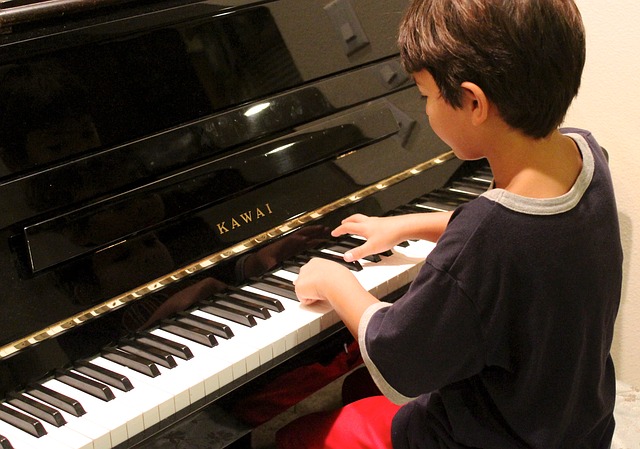It’s never too soon to start teaching your child how to play an instrument. Music is a valuable and enjoyable pastime that has many benefits for children of all ages, and the earlier they begin playing, the more benefits they’ll reap. With this blog post, hopefully, you will get a sense of what it means to teach your child how to play music.

Improved cognitive function
One of the primary benefits of teaching your child how to play an instrument is that it can give them a boost in cognitive function, as research has found. It’s been proven that playing music, in all its forms and expressions, can help children become better learners and think more clearly about the world around them. This means that regardless of the musical instrument that your child is interested in, they will likely benefit from playing it.
For instance, in playing the piano, children learn about spatial reasoning as they must navigate their fingers around the keyboard. They also learn discipline, patience, and how to focus on a task for an extended period. These are all valuable skills that can help children in other areas of their lives, including schoolwork and beyond. In this case, you need to provide your child with a piece of sheet music to learn the piano. This will allow your young one to understand how to play the instrument and develop his cognitive functions. Rest assured that he will enjoy this process.
Enhanced creativity
In addition to boosting cognitive function, playing a musical instrument can also enhance your child’s creativity. This is because when they’re improvising or composing music, they’re using their imagination and coming up with new ideas in ways that other activities might not inspire them to do. The process of creating music is a very creative one, and children who can tap into this creativity will likely be more imaginative in other areas of their lives as well. As a bonus, many instruments can help improve your child’s fine motor skills too.
Attention span and memory retention
It’s true that most children, especially younger ones, have a short attention span and poor memory recall when compared to adults. However, another one of the benefits of teaching your child how to play a musical instrument is that it can help improve their attention span and memory retention. This is because when they’re learning to play an instrument, they have to focus on what they’re doing and remember the sequence of notes or chords to be successful. In this way, playing music can help children become more attentive and better at remembering things.
Reinforced social development
Another benefit of teaching your child how to play an instrument is that it can reinforce their social development. When children play music with other people, whether in a band or for fun, they are forced to communicate and work together towards the same goal of creating beautiful sounds. This means that when your child starts learning how to play an instrument at a young age, he will have many opportunities to hone his social skills and make friends with other like-minded individuals. As a result, they will develop better social skills and be well-equipped to handle challenging situations outside of the music world.
Better self-esteem
There are indeed plenty of benefits to teaching your child how to play a musical instrument, but one of the most profound may be that it can help boost their self-esteem. This is because when children can master an instrument and play beautiful music, they feel a sense of accomplishment and pride in themselves. They also learn how to work hard and practice regularly to improve their skills, something that carries over into other areas of their lives. In addition, playing music can help your child become more empathetic towards others and better understand emotions.
Self-discipline
Teaching your child how to play an instrument can also help them improve their level of discipline. This is because when they practice playing a musical instrument regularly, they’re being forced to adhere to a schedule and learn how to manage their time wisely. In addition, they’re also learning how to be patient and not give up when things get tough. As a result, your child will likely develop better self-discipline skills that will benefit them throughout their entire lives.
Greater musical understanding and appreciation
In addition to being able to play a particular instrument, children also can develop their musical understanding and appreciation as they grow older by playing music. This can be done in a variety of ways, including singing songs at home with family members or friends, listening carefully when others are playing music, or even attending concerts. When children have a greater understanding and appreciation for music, they are more likely to enjoy it and want to listen to it more often. This can be beneficial in terms of helping them develop their unique musical taste and style.
Positive effect on mental health
As if all of the above weren’t enough, teaching your child how to play a musical instrument can also have positive effects on their mental health over time. When children engage in music-making, they’re happier and less prone to depression or anxiety than when they don’t engage in any creative activities. In addition, playing music can help your child manage stress and improve their moods. This is because when they’re playing an instrument, they’re focusing on the present moment and not letting negative thoughts or emotions bother them. As a result, children who play musical instruments tend to have better mental health overall.

In conclusion, there are many benefits to teaching your child how to play a musical instrument at an early age such as developing their cognitive functions while also enhancing creativity and social development. Furthermore, playing a musical instrument can help improve attention span and memory retention, as well as boost self-esteem. Lastly, teaching your child how to play a musical instrument can help them improve their level of discipline which will benefit them in many ways for years to come.










